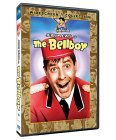| Reviews & Columns |
|
Reviews DVD TV on DVD Blu-ray 4K UHD International DVDs In Theaters Reviews by Studio Video Games Features Collector Series DVDs Easter Egg Database Interviews DVD Talk Radio Feature Articles Columns Anime Talk DVD Savant Horror DVDs The M.O.D. Squad Art House HD Talk Silent DVD
|
DVD Talk Forum |
|
|
| Resources |
|
DVD Price Search Customer Service #'s RCE Info Links |
|
Columns
|
|
|
Bellboy, The
Also helping is the film's loose structure: the plotless film centers around Stanley (Lewis), a bumbling bellboy at the Fontainebleau Hotel in Miami. In place of a story, The Bellboy has what it describes as "a series of silly sequences." One typical sequence has Stanley instructed to take "everything out of the trunk" of an arriving car and take its contents up to the guest's room. Only the car turns out to be a Volkswagen Beetle, though Stanley dutifully removes the car's engine and delivers it to its nonplussed owner.
Though its gags are variable, The Bellboy pretty much works on every level. It's both contemporary (love that jazzy mid-fifties architecture!) and a throwback to two-reel comedies of the late-silent/early-sound era, though it most closely resembles Jacques Tati's M. Hulot's Holiday (1953) in terms of structure and pacing. And, like Tati's features, it keeps dialogue to a minimum, rendering its nearly-silent protagonist more an observer than force of action.
Lewis himself saw the project as a tribute to Stan Laurel, whom Lewis met around this time when the latter was happily retired and living in a small apartment on Ocean Avenue in Santa Monica. There's a bit of Stan in The Bellboy, though mostly it's Lewis transitioning from his Kid character into what would become his wildly inconsistent, oiled-haired '60s screen persona. Though Stanley is little more than a comic type, in some ways it's a more successfully realized characterization because of its very simplicity and because it lacks the drippy sentiment Lewis usually gave his nebbishes.
Stan Laurel himself appears in the film, sort of. Bill Richmond, Lewis's most-frequent collaborator, appears in a running gag (seemingly borrowed from the Laurel & Hardy short Tit for Tat) in a fairly uncanny impersonation of Stan, circa 1934 or so.
Laurel famously preferred short comedy to features; he felt most screen comedy can't sustain itself over the course of a long feature-length movie. Because The Bellboy has no story, at times it plays more like a series of short films, and at 72 minutes is just the right length: it leaves you wanting more, versus, say, The Family Jewels (1965), which has most viewers pleading for it to end.
Video & Audio
The Bellboy looks terrific in its 16:9 widescreen (1.85:1) anamorphic transfer. The black and white image is razor sharp much of the time, and free from age-related wear. The Dolby Digital mono sound is likewise clean, though the film has a minimum of dialogue anyway. An alternate and less pristine French track is offered, along with optional English and Spanish subtitles.
Extra Features
The Bellboy was virtually (literally?) the only Jerry Lewis movie to get Special Edition treatment on laserdisc (compiled by Bob Furmanek), and much of that same material has been carried over to the DVD. As with most of these new Lewis DVDs, this one features an Audio Commentary Track with Jerry Lewis and Steve Lawrence. Unlike most of the commentaries, The Bellboy's is actually worth listening to. This film was Lewis's baby, and he has a clear affection for it, and both Lewis and Lawrence share a nostalgia for the veteran nightclub entertainers that populate its cast of bit players. Lewis also describes Laurel's influence on the project, and in one weird moment Jerry tells Steve that when Stan received got the phone call with news that Oliver Hardy had died, Laurel became so paralyzed with grief "doctors had to do surgery to get the phone out of his hand." Say what?
A Trailer offers footage of Lewis not in the film, playing multiple roles. It's also 16:9, and complete with narration and text. Also included are four promo spots, which play like mini or alternate theatrical trailers rather than something that aired on television, though maybe they did.
Seven minutes of Rehearsal Footage captures Lewis joking with Walter Winchell and excerpts his nightclub act. Deleted Scenes and a Blooper with Milton Berle are several minutes of okay material. More interesting is a filmed message to Stan Laurel, shot after Jerry [Received] a Letter from Stan Laurel. Finally, there's great 16mm color footage of the Bellboy Bus Tour with Son Chris Lewis Commentary. This runs but a few minutes but features a fascinating glimpse of Lewis on the road promoting his film and making personal appearnaces, at such showplaces as the Loew's 46th Street Theater (where The Bellboy topped a double-bill with Tarzan the Magnificent). All of this footage is 4:3 full frame.
Parting Thoughts
The Bellboy is an excellent introduction to Jerry the Solo Comedian. It's short and sweet and actually funny most of the time. As a first feature it's even a remarkable achievement: Jerry Lewis the comedian is in fine form, thanks to Jerry Lewis the enthusiastic, eager-to-please filmmaker. Both keep their vanity in check, and the result is a terrific, unassuming little movie, a classic of its kind.
Stuart Galbraith IV is a Los Angeles and Kyoto-based film historian whose work includes The Emperor and the Wolf -- The Lives and Films of Akira Kurosawa and Toshiro Mifune. His new book, Cinema Nippon will be published by Taschen in 2005.
|
| Popular Reviews |
| Sponsored Links |
|
|
| Sponsored Links |
|
|
| Release List | Reviews | Shop | Newsletter | Forum | DVD Giveaways | Blu-Ray | Advertise |
|
Copyright 2024 DVDTalk.com All Rights Reserved. Legal Info, Privacy Policy, Terms of Use,
Manage Preferences,
Your Privacy Choices | |||||||













